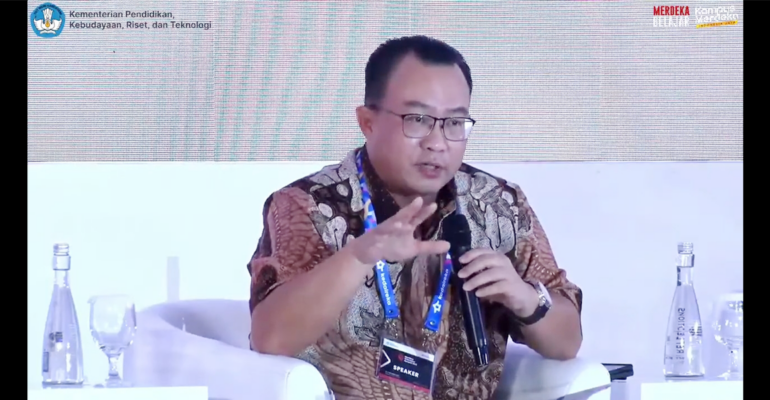Rector of IPB University: Strategic Steps and Optimistic Attitude Needed to Strengthen Industrial and Higher Education Ecosystems

Rector of IPB University, Prof Arif Satria, said that there is a need for strategic steps and an optimistic attitude to improve Indonesia’s performance in the field of innovation. This step is needed to strengthen the partnership ecosystem between universities and industry.
This was conveyed when he became one of the speakers in the Paragon Talks session with the topic ‘Building Innovation Ecosystem and Sustainable Partnerships Between Universities and Industries’ at the Merdeka Innovation Summit 2023.
The event, which was held in order to promote international innovation collaboration by the Ministry of Education, Culture, Research and Technology (Kemendikbudristek), was held at Bidakara Hotel, Jakarta (16-17/11).
According to Prof Arif, when compared to neighbouring countries, Indonesia still faces three issues: innovation, research and entrepreneurship. These issues must be addressed with strategic university programmes, effective communication with industrial partners and collaboration with trust-based industrial partners.
“The number of innovations in Indonesia is still low due to funding constraints. The budget crisis has caused research funding to be allocated only 0.2 per cent of state revenue. This figure is lower than Malaysia, Thailand and Japan,” he explained.
“Budgeting must be more effective and the form of research must also have more impact on society and industry,” he said.
Prof Arif gave an example of several IPB University programmes such as One Village One CEO (OVOC) and Lecturer Pulang Kampung. The programme strengthens the role and collaboration between IPB University alumni and local farmers as industrial partners in rural areas to be more productive.
“As a result, agricultural products from rural areas are able to be distributed to domestic markets and exported to various countries. Our programme can be an example so that research and innovation created have more impact on society and industry,” he explained.
He added that events such as the Merdeka Innovation Summit need to be expanded and sharpened so that industries in Indonesia and abroad are increasingly interested in collaborating with higher education.
Prof Arif also explained that communication issues between researchers and industry also need to be resolved. Researchers must be able to present their innovations to industrial partners effectively. Collaboration with industrial partners also needs to be built based on trust with integrity and capability as the basis.
“IPB University has created the concept of techno sociopreneurship to support the strengthening of cooperation between industry and universities. This effort continues to be encouraged by the construction of Science Techno Park, Startup Centre and cooperation with Kedai Reka,” he continued.
He added that by holding events like the Merdeka Innovation Summit, it will open up more insights for the preparation of a better collaboration strategy between industry and higher education.
“We see that abroad, industry and higher education ecosystems are formed, facilitated by the government. With events like this, innovation can grow and affect gross domestic product (GDP) per capita per year. This correlation can make our dream to reach the top four in the world in 2045,” said Prof Arif. (IAAS/RUM)


